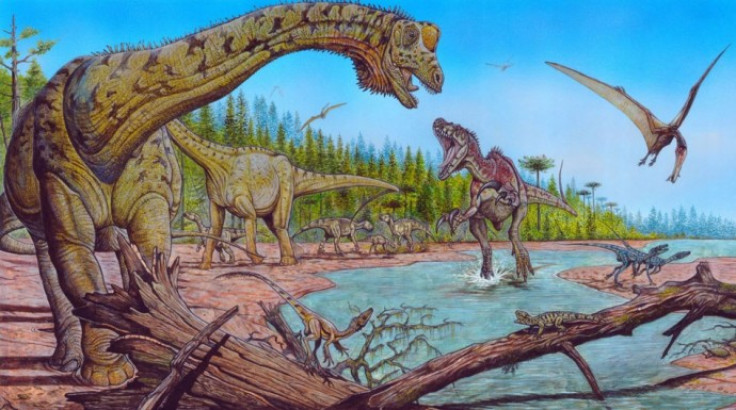Dinosaurs' Bad Timing: Creatures Had Potential to Survive 'Perfect Storm of Events' if Asteroid Struck Earlier

Dinosaurs might have survived the asteroid strike that wiped them out if it had taken place slightly earlier or later in history, but instead fell victim to a "perfect storm of events", according to a study.
A fresh study using up-to-date fossil records and improved analytical tools has helped palaeontologists build a new narrative of the prehistoric creatures' demise, some 66 million years ago.
They found that in the few million years before a 10km-wide asteroid struck what is modern-day Mexico, Earth was experiencing environmental upheaval. This included extensive volcanic activity, changing sea levels and varying temperatures.
At the time, the dinosaurs' food chain was weakened by a lack of diversity among the large plant-eating dinosaurs on which others preyed, likely due to changes in the climate and environment.
This created a perfect storm in which dinosaurs were vulnerable and unlikely to survive the aftermath of the asteroid strike.
Dr Steve Brusatte, of the University of Edinburgh's School of GeoSciences, said: "The dinosaurs were victims of colossal bad luck. Not only did a giant asteroid strike, but it happened at the worst possible time, when their ecosystems were vulnerable. Our new findings help clarify one of the enduring mysteries of science."
"It was a perfect storm of events that occurred when dinosaurs were at their most vulnerable," he told BBC News.
The impact event would have caused tsunamis, earthquakes, wildfires, sudden temperature swings and other environmental changes. As food chains collapsed, this would have wiped out the dinosaur kingdom one species after another. The only dinosaurs to survive were those who could fly, which evolved to become the birds of today.
Researchers suggest that if the asteroid had struck a few million years earlier, when the range of dinosaur species was more diverse and food chains were more robust, or later, when new species had time to evolve, then they very likely would have survived.
An international team of palaeontologists led by the Universities of Edinburgh and Birmingham studied a catalogue of dinosaur fossils, mostly from North America, to examine how dinosaurs changed over the few million years before the asteroid hit.
Dr Richard Butler of the School of Geography, Earth and Environmental Sciences at the University of Birmingham, said: "Although our research suggests that dinosaur communities were particularly vulnerable at the time the asteroid hit, there is nothing to suggest that dinosaurs were doomed to extinction. Without that asteroid, the dinosaurs would probably still be here, and we very probably would not."
Co-author Paul Barrett, of the British Natural History Museum, told the Guardian: "The great dinosaur mass extinction has been one of the world's biggest mysteries and has captured the imaginations of many people.
"Although some types of dinosaurs were already declining in numbers before the famous asteroid impact, in most cases this impact was the smoking gun for the cause of the extinction.
"This new work provides the best evidence for sudden dinosaur extinction and for tying this event to the asteroid impact rather than other possible causes such as the longer-term effects of the extensive volcanic activity that occurred at the end of the cretaceous."
The study was published in the journal Biological Reviews.
© Copyright IBTimes 2024. All rights reserved.






